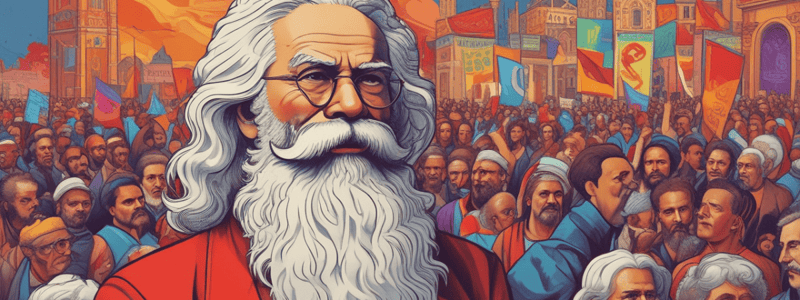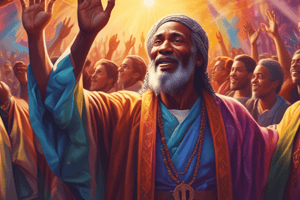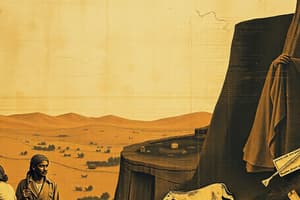Podcast
Questions and Answers
According to the passage, which of the following were key factors that influenced the development of Liberation Theology?
According to the passage, which of the following were key factors that influenced the development of Liberation Theology?
- Calls for greater individualism and personal salvation within the Catholic Church
- Economic prosperity and political stability in Latin America
- Increased secularization and separation of church and state in the region
- Economic inequality, poverty, and political oppression in Latin America (correct)
How did Marx's concept of class struggle influence the development of Liberation Theology?
How did Marx's concept of class struggle influence the development of Liberation Theology?
- It led theologians to view their struggles against authoritarian governments and unjust economies as part of a larger global conflict. (correct)
- It encouraged Latin American theologians to focus on the struggles of the ruling elite against the marginalized people.
- It had no significant influence on the development of Liberation Theology.
- It caused theologians to reject the idea of class struggle and instead focus on individual salvation.
According to the passage, which of the following aspects of Marx's thought contributed significantly to the development of Liberation Theology?
According to the passage, which of the following aspects of Marx's thought contributed significantly to the development of Liberation Theology?
- His emphasis on the importance of private property and the free market.
- His materialist conception of history, the concept of alienation, and the idea of a proletarian class struggle. (correct)
- His belief in the inevitability of communist revolution.
- His rejection of religion and advocacy for a secular society.
How did the connection between Liberation Theology and Marxism influence the relationship between the Catholic Church and the political sphere in Latin America?
How did the connection between Liberation Theology and Marxism influence the relationship between the Catholic Church and the political sphere in Latin America?
What role did 'basic communities' play in the development and implementation of Liberation Theology?
What role did 'basic communities' play in the development and implementation of Liberation Theology?
Which of the following is NOT a key figure associated with Liberation Theology?
Which of the following is NOT a key figure associated with Liberation Theology?
What is the relationship between theology and politics in Liberation Theology?
What is the relationship between theology and politics in Liberation Theology?
What is the significance of the concept of "basic communities" in Liberation Theology?
What is the significance of the concept of "basic communities" in Liberation Theology?
What is the primary goal of social justice as understood by Liberation Theology?
What is the primary goal of social justice as understood by Liberation Theology?
What is the significance of the concept of "praxis" in Liberation Theology?
What is the significance of the concept of "praxis" in Liberation Theology?
Flashcards are hidden until you start studying
Study Notes
Introduction
Liberation Theology is a unique blend of religious faith and political activism that emerged from the Catholic Church in Latin America during the mid-20th century. It was developed against the backdrop of economic inequality, poverty, and political oppression, particularly in countries like Brazil, Chile, Colombia, El Salvador, Guatemala, Nicaragua, Peru, and others. This article explores the connection between Liberation Theology and Marx, focusing on key concepts such as Marxist analysis, liberation movements, theology and politics, social justice, and basic communities.
Marxist Analysis
Marx's ideas were crucial to understanding Liberation Theology. His concept of class struggle influenced Latin American theologians who saw their struggles against authoritarian governments and unjust economies as part of a larger global conflict between the ruling elite and marginalized people. In his work, Marx described capitalist societies as inherently exploitative and oppressive because they rely on economics rather than human needs. This perspective resonated with many Christian theologians who felt that their faith called them to address these issues.
Three aspects of Marx's thought contributed significantly to Liberation Theology: the materialist conception of history, the concept of alienation, and the idea of a proletarian class struggle. These ideas helped theologians understand how historical processes shape society and create economic inequalities.
Liberation Movements
The rise of Liberation Theology coincided with burgeoning liberation movements across Latin America. These movements sought to challenge entrenched power structures through political activism, popular mobilization, and grassroots organizing. Theology played a critical role in these movements by providing moral legitimation, spiritual sustenance, and strategic guidance. Key figures associated with this phenomenon include Gustavo Gutiérrez, Jon Sobrino, Leonardo Boff, and Ivone Gebara.
These theologians recognized the need for practical action alongside theoretical reflection, which led them to engage directly in social struggles. They worked tirelessly to build alliances among peasants, workers, students, and other oppressed groups, helping to foster a culture of democratic participation and social transformation. Their efforts resulted in numerous protests, strikes, and demonstrations aimed at challenging repressive governments and neoliberal policies.
Theology and Politics
The relationship between theology and politics in Liberation Theology is complex and dynamic. On the one hand, theology serves as a tool to critique existing power relations and inspire resistance among the oppressed. On the other hand, it also seeks to propose alternative forms of political organization rooted in solidarity, community building, and nonviolent confrontation.
Liberation Theology emphasizes the importance of praxis - combining theory and practice in order to bring about real change. In the words of Paulo Freire, a leading figure in pedagogical theories of liberation, "Education either functions as an instrument which is used to facilitate integration of the younger generation into the logic of the present system and bring about conformity or it becomes the practice of freedom, the means by which men and women deal critically and creatively with reality and discover how to participate in the transformation of their world."
This dual nature of theology - both critiquing and proposing alternatives - has been instrumental in shaping various social justice initiatives worldwide. By linking personal salvation to societal transformation, Liberation Theology challenges Christians to see their faith not just as a private matter but as a public commitment to justice.
Social Justice
Social justice lies at the heart of Liberation Theology. For its advocates, social justice is more than mere welfare programs; it requires a fundamental reordering of society so that all members have access to the resources necessary for full human development. This vision of social justice contrasts sharply with conservative approaches that emphasize individual responsibility over societal obligation.
Inspired by figures such as Dorothy Day and Thomas Merton, who lived among the poor and advocated for their rights, liberation theologians argue that true discipleship demands solidarity with those suffering from economic injustice. Such solidarity involves not only empathy but also action aimed at changing unjust structures.
Basic Communities
The concept of "basic communities" is central to Liberation Theology. These are small, self-organized groups of people who come together based on shared experiences of oppression or marginalization. They are characterized by mutual support, shared leadership, and a commitment to collective action.
The idea of basic communities reflects a shift away from traditional hierarchical structures within the Church towards more egalitarian forms of organization. This shift mirrors broader trends towards greater democratization in Latin America and beyond. By fostering a sense of solidarity and shared purpose among the marginalized, basic communities contribute significantly to the broader project of social transformation.
Conclusion
Liberation Theology and Marx share a common commitment to understanding and overcoming social injustice. Through its emphasis on praxis, social justice, and the role of basic communities, Liberation Theology offers a unique perspective on how faith can inspire political activism and contribute to societal transformation. As we continue grappling with issues of economic inequality, political oppression, and environmental degradation, the insights offered by Liberation Theology remain highly relevant today.
Studying That Suits You
Use AI to generate personalized quizzes and flashcards to suit your learning preferences.




